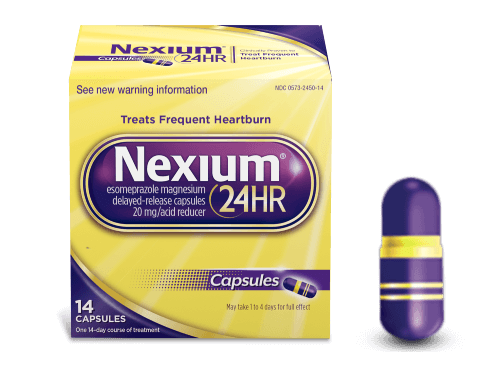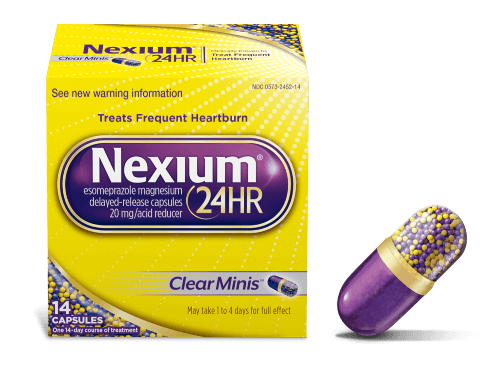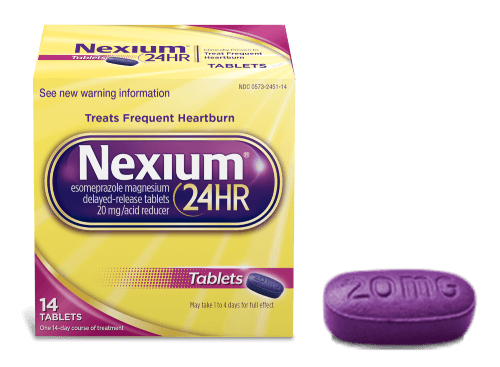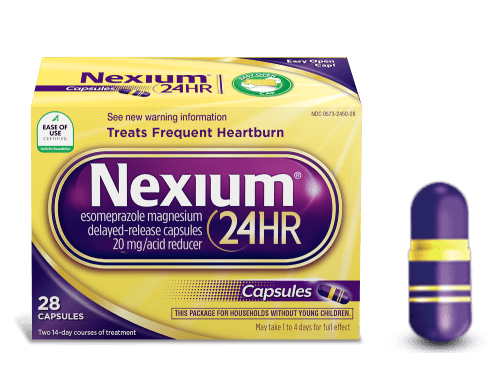Heartburn and gastroesophageal reflux disease (GERD) aren’t uncommon conditions, and although only up to 20% of the US population has GERD, almost everyone will experience heartburn at some point.1 However, frequent or even daily heartburn can impact your quality of life. Find out what causes frequent heartburn and how you can manage your symptoms.
How Do I Know if I Have Frequent Heartburn?
The term “frequent heartburn” refers to heartburn that occurs more than two or more days per week.2 Heartburn can be uncomfortable, and in some cases, painful.
People with frequent heartburn may experience one or more of the following symptoms two days per week or more:3
- A burning pain in the chest that occurs after eating
- Pain that worsens when lying down or bending over
- A bitter or acidic taste in the mouth
Causes of Frequent Heartburn
Acid reflux, also known as gastroesophageal reflux, occurs when stomach acid comes back up into your esophagus.4 Generally, your lower esophageal sphincter works to prevent acid reflux; however, our bodies aren’t perfect, and many people experience acid reflux every once in a while.4 If you experience acid reflux often, frequent heartburn may result as a symptom.
Common Heartburn Triggers
What you eat on a daily basis can trigger heartburn. Foods that trigger heartburn include:3
- Spicy foods
- Citrus fruits
- Tomato-based products
- Fatty or fried foods
- Peppermint
- Chocolate
- Alcohol
- Carbonated or caffeinated beverages
Ways to Prevent Frequent Heartburn
Managing heartburn encompasses both prevention and treatment. There are numerous lifestyle changes and habits you can implement to manage your heartburn over time, which can include:
- Avoiding going to bed with a full stomach. Try to eat meals at least three to five hours before you lie down to allow ample time for digestion.5
- Eating smaller portions. Cutting down on the size of your meals during the day can lower your risk of getting heartburn.5
- Eating slowly. Eating too quickly can put you at risk for experiencing heartburn.5
- Maintaining a healthy weight. People who are overweight may be at higher risk for experiencing heartburn.3
- Avoiding trigger foods and beverages. Certain trigger foods can vary among individuals.3
- Wearing loose, comfortable clothing. Tight clothing and belts can sometimes cause heartburn by exerting abdominal pressure.5
- Quitting or avoiding cigarettes.6 Nicotine can weaken your lower esophageal sphincter over time and cause heartburn by allowing stomach acid to flow backward into the esophagus.6
Certain medications and supplements can also cause heartburn by irritating the lining of your esophagus.7 Always read product labels and talk to your doctor before taking any new medications if you’re experiencing frequent heartburn.
If you follow the recommendations above and still experience frequent heartburn, treatment may be required. Most often, frequent heartburn is treated by medicine like proton pump inhibitors (PPI).8 Nexium 24HR is a PPI that stops acid before it starts. Just one pill a day for 14 days gives you 24-hour protection.* Explore Nexium 24HR products now.
* Use as directed for 14 days to treat frequent heartburn. Do not take for more than 14 days or more often than every 4 months unless directed by a doctor. Not for immediate relief.
Source Citations:
- Acid Reflux. American College of Gastroenterology. https://gi.org/topics/acid-reflux/. Accessed 9/24/2024.
- Gastroesophageal Reflux Disease (GERD). Rush University. https://www.rush.edu/conditions/gastroesophageal-reflux-disease-gerd/. Accessed 9/24/2024.
- Heartburn. Mayo Clinic. https://www.mayoclinic.org/diseases-conditions/heartburn/symptoms-causes/syc-20373223/. Accessed 9/24/2024.
- Symptoms & Causes of GER & GERD. National Institute of Diabetes and Digestive and Kidney Diseases. https://www.niddk.nih.gov/health-information/digestive-diseases/acid-reflux-ger-gerd-adults/symptoms-causes/. Accessed 9/24/2024.
- Heartburn: Causes, Symptoms & Treatment. Cleveland Clinic. https://my.clevelandclinic.org/health/diseases/9617-heartburn-overview/. Accessed 9/24/2024.
- Smoking and the Digestive System. John Hopkins Medicine. https://www.hopkinsmedicine.org/health/conditions-and-diseases/smoking-and-the-digestive-system/. Accessed 9/24/2024.
- GERD: Can certain medications make it worse? Mayo Clinic https://www.mayoclinic.org/diseases-conditions/gerd/expert-answers/heartburn-gerd/faq-20058535/. Accessed 9/24/2024.
- Treatment for GER & GERD. National Institute of Diabetes and Digestive and Kidney Diseases. https://www.niddk.nih.gov/health-information/digestive-diseases/acid-reflux-ger-gerd-adults/treatment/. Accessed 9/24/2024.





